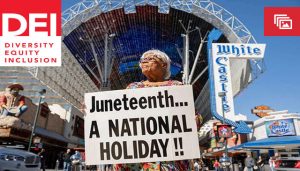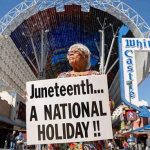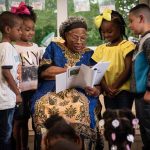Texas Children’s team member Ahjani Harris didn’t quite know what to say when she learned her grandmother planned to walk from Fort Worth to Washington D.C. to raise awareness of Juneteenth and urge the federal government to make it a national holiday.
A retired educator and devoted community activist, Opal Lee was already 89 years old when she decided in 2016 to trek the 1,400 miles to the nation’s capital. Harris and others in the family worried about their beloved Madear’s health and safety on what would likely be an arduous journey.
They reminded her of her age. They warned her she could hurt herself.
But they also knew better than to try and stop her – an indomitable Civil Rights icon in her own right, who has since become known as the “Grandmother of Juneteenth” and been nominated for the 2022 Nobel Peace Prize.
And so they marched with her, 2.5 miles a day to symbolize the 2.5 years that enslaved people in Texas waited to learn of their freedom; through Arlington, Grand Prairie, Dallas and 14 different states; collecting millions of signatures of support along the way.
“She’s a very majestic person, very methodical in how she speaks and what she says,” Harris said of Lee, who was at the side of Pres. Joe Biden at the White House last year when he signed the bill that enshrined Juneteenth as the first new federal holiday in nearly four decades.
“Her train of thought is very intentional, almost relentless,” Harris said. “She was walking those steps to ensure that it did, and it would, and it has. But she would tell you herself that it’s just the tip of the iceberg. Nobody is free until all of us are free.”
Long before it became a federal holiday, black communities in Texas and around the nation had commemorated June 19 as the day when Union troops told more than 250,000 enslaved people in Galveston they had been freed by the Emancipation Proclamation. They were the last enslaved people in the country to hear the news.
Throughout her youth, Lee and her family recognized Juneteenth with picnics in the park – first in Marshall and then in Fort Worth, where they moved into a predominately white neighborhood when she was 10 years old.
Just two years later, a mob burned down the family’s Fort Worth home in an act of racial violence. No one was ever held accountable for the crime, and Harris believes the experience was one of the sparks that ignited her grandmother’s passion for racial and social justice.
“Moving to Fort Worth and being the only black family in those days was not an exciting and welcoming thing,” Harris said. “Those moments impacted her to do what she’s done and what she’s still doing. She found a cause that was dear to her heart and she’s been consistent with it.”
Thanks to Lee’s advocacy and influence, the city of Fort Worth now celebrates Juneteenth in grand style with a parade, a pageant and a variety of events. The celebration also includes Opal’s Walk for Freedom, led by Lee, which spans 2.5 miles and draws hundreds of participants.
Tell them ‘freedom is for everybody’
Her Madear stays so busy uplifting others that it took Harris nearly a week to reach her about the Liberty Bell Award, which the Texas Young Lawyers Association recently presented to Lee in honor of her contributions toward strengthening the effectiveness of the justice system.
Lee had always pushed her family to seek education, acquire knowledge and read ravenously. She had once given Harris a deck of cards featuring Black historical figures for Christmas and cheered her on as she recited facts about each one. She had taken her grandchildren to downtown Fort Worth to see The Historic Wall commemorating the thriving African-American commercial district that had once been there, and to Atlanta to trace the footsteps of Civil Rights Movement leaders.
In her younger days, Harris had almost taken Lee’s community service and activism for granted. Yet as she prepared to accept the Liberty Bell Award for her grandmother, she was reminded anew of her legacy and the privilege of carrying it forward in her own way – volunteering at the Houston Food Bank, advocating for children, and using her role as a Business Operations Coordinator at Texas Children’s to promote inclusiveness and help give everyone a seat and voice at the table.
But what message would Lee want Harris to bring on her behalf?
“She said to tell them that we believe freedom is not a black thing or a Texas thing. Freedom is for everybody,” Harris said. “There are a lot of disparities that need to be addressed before we can all be free. There’s still a lot of work to be done.”
When she stepped to the podium at the Liberty Bell Award ceremony, the entire audience rose to give Lee a standing ovation. As Harris waited for everyone to sit down so she could begin her remarks, another round of thunderous applause rippled through the room.
Harris had seen firsthand how influential and beloved her grandmother was – Lee was a mainstay in local and national news, and people had been stopping her on the street for photos and autographs for years. But the outpouring of appreciation still left her in awe of her Madear and the monumental impact she continues to make.
“It was very humbling to accept that award and stand in the fullness of what she’s done and her accomplishments,” Harris said. “They understood her efforts and the fact that freedom is a true luxury – we fight for it, we gain it and still have so far to go. For me, the importance really stands in getting the message out. You have to equip people with knowledge so they can fight adversity.”












